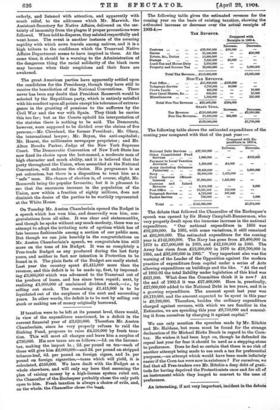lion.Tax Nevem.. 22,460,000
The great American parties have apparently settled upon the candidates for the Presidency, though they have still to receive the benediction of the National Conventions. There never has been any doubt that President Roosevelt would be selected by the Republican party, which is entirely satisfied with his conduct upon all points except his tolerance of extrava- ganee in the granting of pensions to the sufferers by the Civil War and the war with Spain. They think he carries this too far; but as the Courts uphold his interpretation of the statutes there is nothing to be said The Democrats, however, were supposed to be divided over the claims of five persons,—Mr. Cleveland, the former President ; Mr. Olney, the international lawyer; Mr. Bryan, the anti-capitalist ; Mr. Hearst, the millionaire newspaper proprietor ; and Mr. Alton Brooks Parker, Judge of the New York Supreme Court. The Democratic Convention of New York State baa now fixed its choice upon the last-named, a moderate man of high character and much ability, and it is believed that the party throughout the Union, when assembled at the National Convention, will endorse the choice. His programme is as yet colourless, but there is a disposition to treat him as a "safe" man. His chance of election is, of course, slight, Mr. Roosevelt being the popular favourite; but it is pleasant to see that the enormous increase in the population of the Union, now within a fraction of eighty millions, does not diminish the desire of the parties to be worthily represented at the White House.
On Tuesday Mr. Austen Chamberlain opened the Budget in a speech which has won him, and deservedly won him, con- gratulations from all sides. It was clear and statesmanlike, and though he spoke without any mock-modesty, there was no attempt to adopt the irritating note of egotism which has of late become fashionable among a section of our public men. But though we can join heartily in the congratulations on Mr. Austen Chamberlain's speech, we congratulate him still more on the tone of his Budget. It was as completely a Free-trade Budget as any produced during the last forty years, and neither in fact nor intention is Protection to be found in it The plain facts of the Budget are easily stated. Last year the country spent £5,415,000 more than the revenue, and this deficit is to be made up, first, by impound- ing £3,000,000 which was advanced to the Transvaal out of the produce of loans, and has since been repaid; next, by realising £1,000,000 of unclaimed dividend stock,—i.e., by selling out stock. The remaining £1,415,000 is to be liquidated out of the surpluses of the next and succeeding years. In other words, the deficit is to be met by selling out stock or making use of money originally borrowed.
The following table shows the estimated expenditure of the coming year compared with that of the past year :—
National Debt Services ... Z27,000,000 Other Consolidated Fend 1,640,000
PaL,0,art to Local Taxation
1,160,000 Army (including Ordnance 29,400,000 36,849,000 Civil Services (Mined- 27,584,000 Custom. and Inland Revenue 3,101,000 Poet Office ... 10,201,000 Telegraph Service 4,710,000
Packs; Berri,* 780.000
Total 8142,890,000










































 Previous page
Previous page